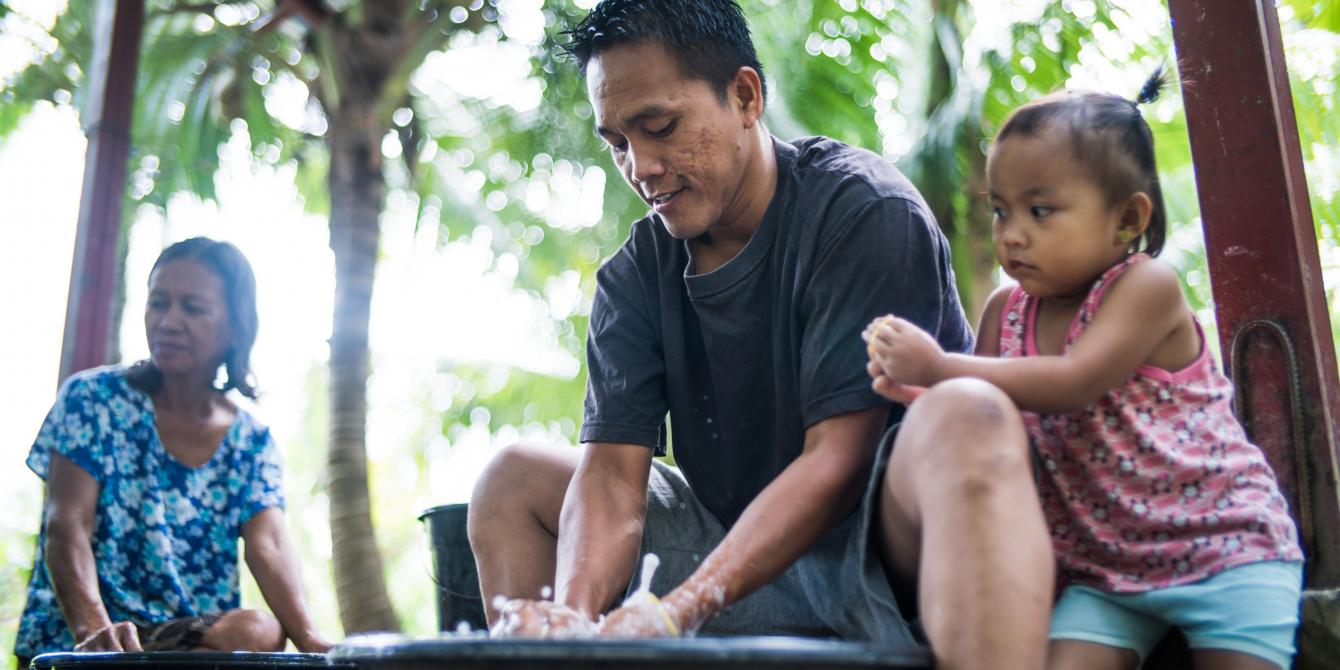
When fathers care
The COVID-19 pandemic has brought unprecedented changes to our way of lives. For one, work-from-home arrangements have turned our homes into our workspaces, creating a dilemma about when work exactly begins and ends each day.
The boundary separating work from personal life is even worse for those who must juggle unpaid care and domestic work responsibilities on top of breadwinning.
As a working father, I have a critical responsibility of ensuring that I meet the expectations and demands of my job, while at the same time looking after the welfare and needs of my family. Back-to-back online meetings and care work tasks sometimes mean extended work hours at night or early morning, limited hours of sleep, and lesser quality family time.
But men’s share of care work is just a small slice of the pie. The fact remains that women for the longest time have been disproportionately bearing the burden of care work.
It’s even more complicated for parents who are faced with the additional challenging task of supporting their children in online classes – a task borne more often by mothers. It must be an even more challenging time for women who are solo parents, and those from poor and marginalized communities, and indigenous groups. Even worse for women who are locked down in their homes with abusive partners and are experiencing domestic and gender-based violence.
The 2021 National Household Care Survey by Oxfam, the Philippine Commission on Women, UN Women WeEmpowerAsia, and partner organizations, showed that while men spent more hours doing housework due to the pandemic, the majority of the tasks at home are still shouldered by women. The proportion of time spent by women on unpaid care work, including supervision of children and elderly members of the family, is 13 hours a day compared to only eight hours for men. Procuring household needs along with laundry, and water and fuel collection were reported by both men and women as the most difficult housework during the pandemic.
Moreover, while the data gathered from urban and rural communities showed an increase in hours spent by men on unpaid care and domestic work, there was no indication that this was due to a shift in perception that care work is no longer seen as women’s role; and thus, there is no guarantee that this is a practice that will be sustained beyond the pandemic
Even before the pandemic, the heavy and unequal responsibilities of care work have limited women from pursuing opportunities in paid employment, education, politics, or activities of their choice, including rest and sleep.
Oxfam’s study also found that unpaid care and domestic work burdens have negatively impacted the health and well-being of women. One-third of the women that we surveyed said that they had experienced an injury, illness, or disability from doing care work in the past six months during the pandemic.
With the pandemic, women working on the frontlines also face higher health risks. The rising cases of COVID and slow vaccination rollout in the Philippines are gravely putting at risk the lives of women, who comprise 70-percent of the world’s health workers, and those in the informal sector, who don’t have the luxury of working from home.
Indeed, the pandemic is now exposing and even deepening longstanding gender and economic inequalities, which often start at home.
Good news is we can still change this.
We can create a better future if we all recognize that care work is not the responsibility of women alone and that it must be redistributed across the family.
We can create a better future if the government will enact policies and legislation that will support the care economy and provide the infrastructure and services that will reduce unpaid care work burden for women. For example, the improvement of water systems, daycare services, and health care delivery especially to those family members with COVID-19 will result in the reduction and redistribution of housework. In the current pandemic context, cash transfer programs and other support services for poor women and men with unpaid care responsibilities, especially those who are taking care of sick family members, can contribute to family budgets, subsidize the cost of caring or compensate for foregone income of these care-givers.
We can create a better future if the private sector will support a decent work agenda by implementing workplace policies such as flexible work arrangements, increased parental leaves, and employer-supported childcare.
Most importantly, we can create a better future if we have more men who will challenge traditional thinking and recognize their equal share of care and domestic work responsibilities at home.
The future is equal when fathers care and take on their equal share.
###
This article is originally written by Randee Cabaces for ABS-CBN News, 01 July 2021: https://news.abs-cbn.com/blogs/opinions/07/01/21/domestic-work-oxfam-equality-home

 Follow us on Facebook
Follow us on Facebook Instagram
Instagram Follow us on Twitter
Follow us on Twitter LinkedIn
LinkedIn